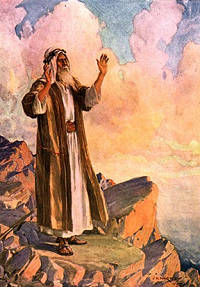Some lessons from Moses' intercessory prayer.
 Photo: Pixabay (CC)
Photo: Pixabay (CC)
Exodus 32:31 relates one of the most astounding episodes of biblical intercession. The prophet Moses asks the Lord to forgive the Hebrews on the heels of the infamous golden-calf affair.
Today we are going to look at four key attitudes of Moses in the hope that we can apply them to our own prayer life.
1.- Moses’ attitude towards prayer
The text starts by stating, “And Moses returned unto the Lord” (v. 31). He returned, that is, he went back. A little bit earlier in the chapter he had already sought the Lord, beseeching His mercy (vv. 11-13). So now he goes back to pray the same prayer as before.
There are a few things we can learn from this act of returning.
First of all, Moses found himself praying time and time again. Just as Abraham lifted up altar after altar in the book of Genesis, Moses too sought the Lord continually. He walked with God. Paul tells us in Colossians 4:2, “Continue in prayer”. The Lord Jesus taught the parable of the widow and the judge that men ought, “always to pray and not to faint” (Luke 18:1). Prayer is to be a continual companion of God’s children.
Secondly, Moses presented the same petition twice within the space of one chapter. He asked God for mercy upon the people. This example serves to counter the notion that asking the same thing twice in prayer is unbelief. There is nothing wrong with preseting the same request over and over again. Isn’t that what the parable of the widow and the judge is all about?
Application: Let us return to the place of prayer on a daily basis, seeking the God of Moses and persisting therein with godly perseverance. We cannot advance much in the Christian life if we are not continually returning to God’s presence.
2.- Moses’ attitude towards God
Moses attitude is one of submission to the Lord throughout. His request (v. 32) presupposes the sovereignty and almightiness of the Most High. Oh, Lord, forgive them! If not, kill me! Take my life!
This is a far cry from some so-called prayer meetings in which worshippers spend their time decreeing and declaring in the name of the Lord. Scripture contains some 30,000 verses and there is not one single example of such binding and loosing in prayer time. Prayer is to humble one’s heart before the Lord and, like Christ, to offer up supplications in the fear of the Lord (Hebrews 5:7).
Application: The bigger we see ourselves; the smaller our view of God. It’s time to get back to tears, ashes and dust. It’s time to stand in awe of the Omnipotent One.
 Moses prayed for God's people on numerous occasions. /
Moses prayed for God's people on numerous occasions. / 3.- Moses’ attitude towards the situation
Moses’ prayer was as sincere as could be. “Oh, this people have sinned a great sin and have made gods of gold” (v. 31). He didn’t try to butter up the situation; his confesion was crystal clear.
Daniel too was very forthright in confessing his people’s sin (Daniel 9:5-6). The same can be said for Ezra (Ezra 9:6-7). Intercessors are not afraid to call things by their name. Confession of sin(s) is a vital part of intercessory prayer. “He that covers his sins shall not prosper; but whosoever confesses and forsakes them shall have mercy” (Proverbs 28:13).
In many prayer services, most of the time is dedicated to petitions (“Lord, do this; Lord, do that”); and some of the time is focused on praise, worship and thanksgiving. But as a good English missionary friend of mine pointed out a few months ago, confession of sin has all but disappeared from the contemporary prayer service. How come?
Application: Let us not sow fig-leaves to cover our nakedness. May we be swift to confess our faults before the Lord knowing that if we do so, the Lord “is faithful and just to forgive us our sins and to cleanse us from all unrighteousness” (1 John 1:9).
4.- Moses’ attitude towards the people
Moses request also shows us how he felt towards the people. He asked the Lord for forgiveness and if the Lord decided not to pardon His people, Moses added, “If not, blot me, I ask you, out of the book which you have written” (v. 32).
Blot me out of your book! In other words, he is asking the Lord to take his life. How could anyone pray in such a fashion? This is the heart of true intercession. Paul was to say something even more radical in the New Testament, “For I could wish that myself were accursed from Christ for my brethren, my kinsmen according to the flesh” (Romans 9:3).
Moses, let’s remember, was not praying for saints; but for a bunch of rebels. They had just been worshipping a golden calf, Egyptian-style! Even before the Mad Cow Affair, the people had done little else than plague Moses with headaches and death-threats. God promised to give Moses a new people, a great nation (v. 10). Anyone with half a brain cell would have replied, “Where do I sign, Lord?” But the prophet Moses replied, “No!”
He loved his people and longed for the fulfilment of God’s promises. So he prayed for his folk –God’s folk- and put his life on the line for them. Only the Spirit of God can lead a man of God to make such a request.
Application: Luther commented that sinners are curved in upon themselves. We need to begin seeing prayer as a time of intercession for others. There is, of course, a time to present our personal requests before the Lord; but God’s cause is so much greater than us. Let us pray for God’s glory and intercede for His people.
Conclusion: Looking Christwards
We cannot wrap up today’s study without turning our eyes to the Lord Jesus.
In his attitude towards prayer, God, sinful situations and His people, He was every bit like Moses. Nevertheless, He did something more.
God decided to pardon His people through Moses’ intercession, albeit no sacrifice for sin was made. Moses was not blotted out of God’s book. How could God forgive unjust sinners without blood being shed? The answer lies in Christ. As Paul reveals in Romans 3:25, God bypassed the sins of His Old Testament saints because He saw them in the light of Christ. The blood of Jesus forgives both the Old and New Testament believers.
Jesus was blotted out of the book of the living so that condemned, calf-loving sinners like Moses’ people could go free and so that condemend, calf-loving sinners like you and I could go free.
Praise God for Jesus Christ.

Las opiniones vertidas por nuestros colaboradores se realizan a nivel personal, pudiendo coincidir o no con la postura de la dirección de Protestante Digital.
Si quieres comentar o